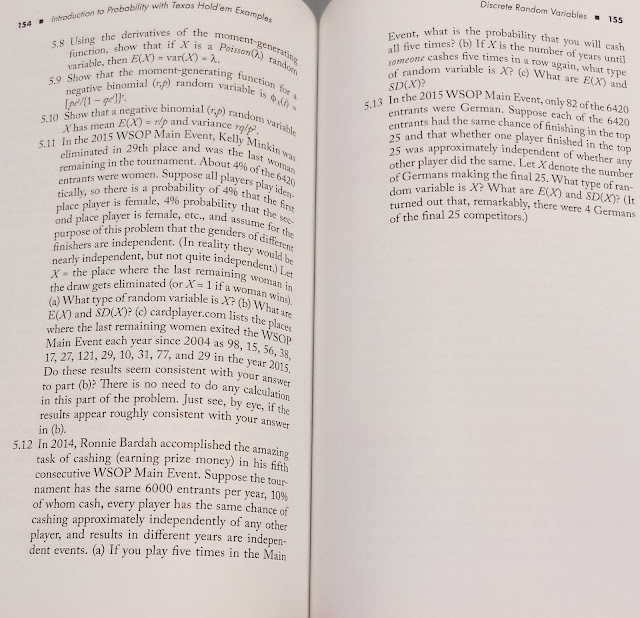In this vein, I thought that Exercise 5.12 at the end of the chapter was pretty neat:
I first encountered Ronnie Bardah when he appeared on a podcast called Occupy Poker, hosted by JC Alvarado and Jon Aguiar. It only lasted for about a year, from 2012-2013 or so, but it was a show that I enjoyed.
Ronnie was a guest on one of the first episodes of the show, and I was captivated by his energy, attitude and story. In particular, I remember that Ronnie talked about a month-long immersion class in Muay Thai boxing that he did in Thailand. Ever since hearing that episode, doing that class or one like it became a bucket list item of mine. I haven't done it yet, and don't know if I'll ever be able to make it happen, but it still sounds like something that would be awesome.
I had saved that episode of the podcast on an SD card, but then my phone did a hard reset and erased that SD card, deleting the only copy of the episode that I had. I'd been meaning to tweet at Ronnie and JC to see if either one of them happened to have a copy of it, but on the day I was going to do it, the Mexico earthquake had just happened. JC is from Mexico and currently lives there, and all of his tweets for that day and many days following were for his fundraising efforts (which ended up being highly successful... this is one of my favorite tweets from that effort). I think the dust might've settled enough that maybe I can reach out now. But, long shot, if anyone reading this happens to have that episode, please let me know!
Ronnie has also since appeared on the Thinking Poker Podcast, and I enjoyed his interview there as well.
Anyways, the question at hand is in regards to Ronnie's famous streak of five consecutive cashes in the WSOP Main Event. As a sort of subliminal message, I've been playing 2014 WSOP footage in the few minutes before class starts; I didn't make a point of highlighting Ronnie's achievement, so I'm not sure if anyone actually took any note of it or not. One other notable occurrence from that year was Mark Newhouse's second consecutive November Nine appearance, which shows up in our textbook as well.
But at any rate, we have an interesting probability question that was inspired by it. Part (b) of the question roughly boils down to: due to chance alone, how long can we expect Ronnie Bardah's record to stand? Obviously if we account for skill differences between players and other factors that the question mentions, this becomes a different story, but it is still probably a reasonable approximation.
If any readers want to take a crack at it, my comments section is at your disposal. I'm actually not even quite sure I've got it yet; I have some ideas, but it's turning out to be more complicated than I first thought! (unless I'm missing something obvious).
On a note unrelated to teaching, but related to the intersection of statistics and poker: these past couple of days, I have been banging my head trying to fully understand a research article from 1973 as it is a key component of a current research project that I am working on. The article is by Dr. Thomas Ferguson, Professor of Statistics at UCLA, it is the seminal paper on Dirichlet Processes, and if you are interested, you can see it here.
Meanwhile, his son, Chris Ferguson, who has become a controversial figure in poker due to his role in Full Tilt Poker (e.g. this article kind of sums it up), and somewhat disappeared altogether from poker for a few years because of it, is currently making a serious run at WSOP Player of the Year this year.
My mind is exploding.
Next up: We finish up discrete distributions and transition into continuous distributions. I've been curious about how our author is going to handle this, because everything in poker is by nature discrete. I haven't read ahead too much so we'll see how it goes!

No comments:
What do you think?